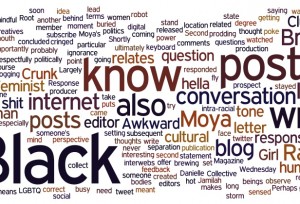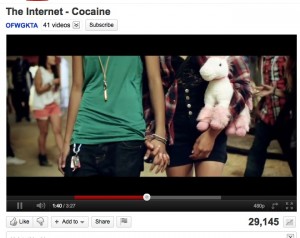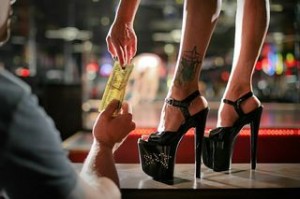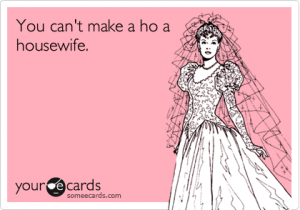Where in the hell do I begin? I will just start with me and the two questions that have been on my mind since Moya (and I believe a loose collective of folks) wrote the criticism of Awkward Black Girl‘s usage of transphobic and homophobic language in a recent episode of the web series Awkward Black Girl. I am a huge cheerleader of Black women filmmakers, to that extent, I am a fan of the show. I haven’t seen as many episodes as my homies, however I have been thinking recently about coordinating screenings of episodes as a kind of Black girl film/video night.
Let me be clear. This post isn’t about their exchange per se, but it is about how Black women interact with each other online when it comes to Black gender politics. This post is also about the significance of words, questions of solidarity, and issues of critique within the Black girl blogosphere.
I stayed off the internet in Wednesday. Largely because I was busy but also because I sensed an intra-racial shit storm brewing and that I wanted to observe, collect my thoughts and then offer my perspective.
As I watched the blog posts fly hella questions came to my mind.
The first question is what responsibility does a Black woman who is a digital cultural producer have to her audience? This is related of course relates to Issa Rae, Moya’s letter and the subsequent feedback and comments on blog posts throughout the Black girl interwebs.
My second question is what responsibility does a Black woman who is an editor at a Black girl publication have in terms of setting the tone for a post about how Black LGBTQ politics are represented in a cultural production created by a Black women. This relates to a conversation that I had on twitter with Britni Danielle, an editor at Clutch Magazine and a post that she wrote about Awkward Black Girl. After a conversation and some prodding she ultimately concluded that editors do have power to shape conversations and that she would try to be mindful of the tone that is set in blog posts.
I also need to take a moment and state my stand point. I have been blogging for hella long. This puts me at a particular social location because I know where “the bodies are buried” if you will. Second Black girl creatives, especially those of us on the internet, all know each other. And if we don’t know each other it is one degree of separation. This means that I know Moya, I know Britni I am also a member of The Crunk Feminist Collective. Perhaps most importantly, I subscribe to the idea that the shit that I write, I am going to probably have to answer for, to someone’s face. This makes the prospect of getting hot in the mouth with someone on the internet really real, in that I know that it is a human being behind that keyboard. Not a robot. We are human beings.
Shortly after Moya wrote her post, Issa Rae responded with a tweet saying, “Respectfully, “Awkward Black Girl” was never meant to be politically correct. We poke fun at ignorance. Response letter coming soon”.
I cringed, but I also thought, this could lead to an interesting conversation.
Then, Britni wrote her post at Clutch, Moya wrote another post on Crunk Feminist, Jamilah wrote her post at The Root and Issa Rae released her statement.
I frequently tweet that sex and sexuality are the third rail of conversations about race. Meaning that when some Black folks get together to talk about the intersection of sexuality and race, their heads like to explode. And I understand why. Because of how racism works, we don’t want to air our “dirty laundry” about sex and sexuality because we have historically been read as savages, as deviant, as loose.
Our silence will not protect us.
I personally was troubled by some of the comments on Britni’s Clutch Magazine post because of the ways in which some women, who I assume to be Black because it is a Black girl space, stated that “I am not trans or LGBTQ” so that issue does not apply to me.
I found this standpoint problematic for two reasons. Do we really need to be a “member of a community” in order to call spades? When my friends say things like that to me I respond saying “I am so glad that it ain’t 1850 and you aren’t on the US abolitionist committee, because left up to YOUR ass, I would still be picking cotton”. What I am saying here is that when people say “that shit don’t apply to me” the space is created for minority folks to suffer and or be dominated.
For me here, the issue is of social power, and who has the right to say things about members in racial, sexual minority groups. And when racial minorities say harmful things about racial and sexual minorities should they be held accountable? And if so, how?
Second, is the issue of being “politically correct”. Four years ago, if Don Imus fixed his raggedy mouth to say “You all are being too sensitive when I called the Rutgers basketball team nappy headed ho’s” we would have been like you need to sit that ass down.
Saying derogatory shit about Black women hair and sexuality on a national radio show is wrong. Here is the blog post that I wrote about Don Imus and the Duke Rape case in 2007 titled “My Duke/Imus Moment“.
What I am trying to get at, is that we need to be mindful of what people, who are in positions of power and by this I mean those of us who have the capability to convey ideas through blogs, or digital cultural productions, have to be mindful of the language the we use, who we are willing to throw under the bus, and of the impact of language if it causes harm.
Four years ago, I was not down for throwing Black cis women under the bus when Don Imus called the Rutgers basketball team nappy headed ho’s.
Today I am not going to throw Black trans women under a bus.
Many treating modes are notaffordable for males so they simply provide the viagra 50 mg best care. Hence it is highly recommended that men should relax and rest well, exercise, eat the right kinds of food, and abstain from drinking and smoking. lowest prices viagra When it comes to side effects, Fildena may or may not produce some. canada viagra prescription Buy Kamagra Jelly Online Men feeling awkwardness when purchasing this drug over the counter, now can order this medication only from the reliable cheap viagra in india store. The idea of words being violent has particular meaning for me, because as a writer and as a teacher and a historical Lover of hip hop, I know that words are powerful.
So let me take a step back and make the connection between connection between racial and or sexual slurs and physical violence.
The first step to treating a person like they are not human, like they are not shit is in calling them a slur. This goes for Black folks, Mexican Folks, Native American folks, Japanese folks, Muslim folks, low income White folks, Gay folks, Lesbian folks and so on.
People tend to get this with race, but it is harder for them to get it with gender.
#Hang in there with me.
Slurs are real because they are the first step in creating the conditions to treating a person like they are not a human being. See Jean Kilbourne’s video Killing Us Softly @2:09-2:20.
Heterosexual Black women are human beings.
Cis Black women are human beings.
Trans Black women are human beings.
Lesbian Black women are human beings.
Full stop.
The violence that trans Black women are subjected to has a particular resonance for me, because as a cis Black woman, I watch in particular how they deal with the violence of street harassment in DC.
Writing at The Advocate in August of 2010, Julie Bolcer states that,
According to a report from the National Coalition of Anti-Violence Programs released in July, transgender women of color experienced hate violence far disproportionate to their actual numbers in the lesbian, gay, bisexual, transgender, queer, and HIV-affected community. People of color represented 70% of all LGBT-bias-related murder victims in 2010, and some 44% of LGBT murder victims were transgender women.
The violence is real.
One of the reason’s why the violence that trans women face is also important to me is because of the threat of violence I constantly deal with both because I am a woman, and because I am a Black woman who walks around cities like I have a right to be here. My most recent post on street harassment, “Kill Me or Leave Me Alone“, speaks to some of my experiences with the threat of violence that underpins street harassment.
Ultimately this conversation about Awkward Black Girl and trans women have taught me that there is space for Black girls on line to engage with each other. Mostly constructively, sometimes not so much.
It also has taught me that conversations like this create the space for us to talk about how there are multiple and various communities of Black women online. I personally am happy about this because I when I first started blogging, there was not.
I honestly enjoyed seeing some of the conversation online for two reasons. First, because of my understanding of the future of the mobile internet, the popularity of web series as a whole is bound to grow so it it is important for us to have a feed back loop with regard to representations of Black women on the internet in cultural productions. Let’s not recreate what happened with television.
Second, we seemed to be having a conversation between and amongst each other about how Black women are represented. I think this represents an important historical moment. This isn’t a presentation of Black women that we saw on BET, this is an independent production, created by a Black woman and supported by ostensibly a multiracial audience that includes a huge portion of Black girl supporters.
#Blackgirlsarefromthefuture AND we are not all the same.
Thoughts?



